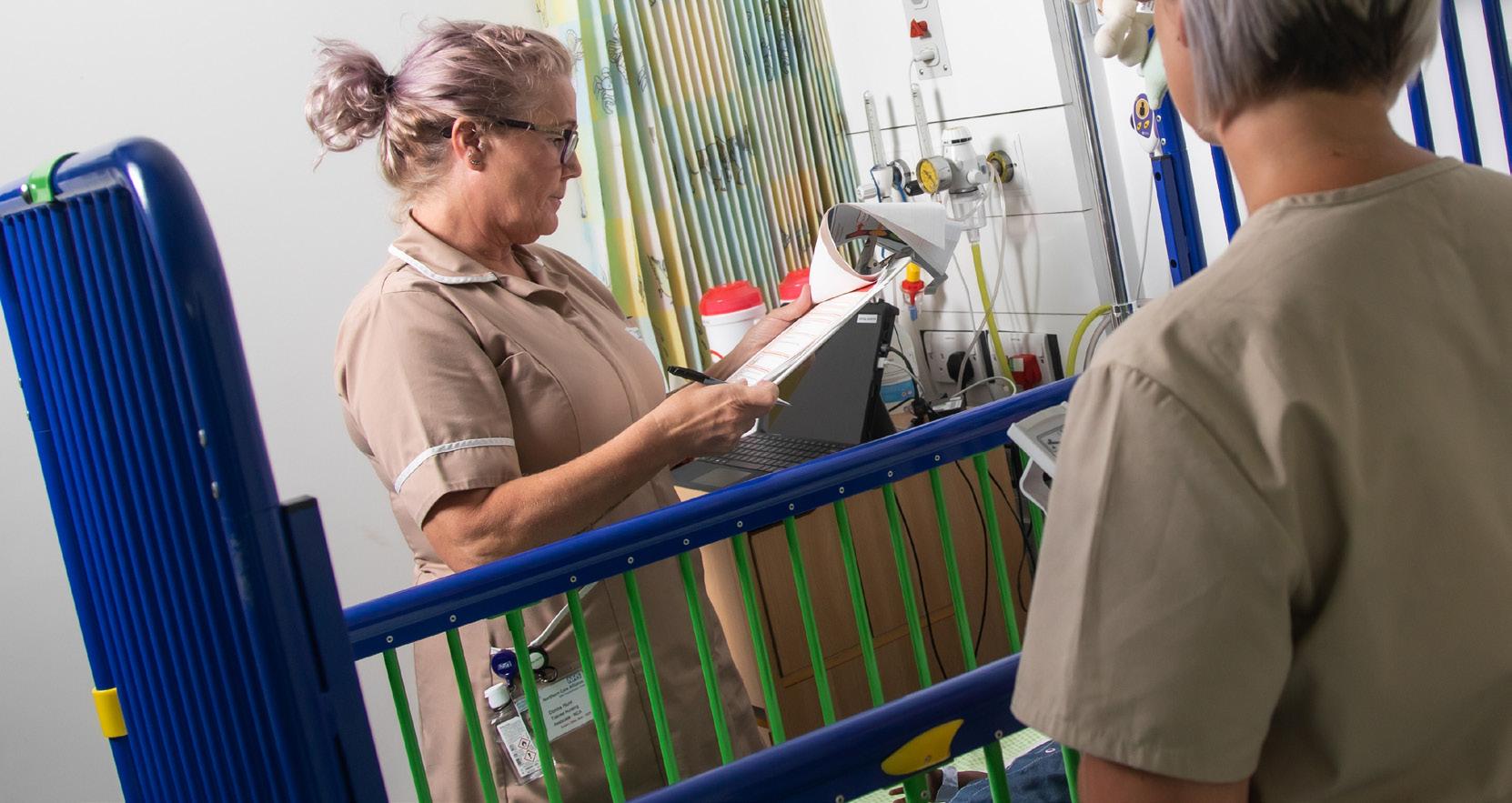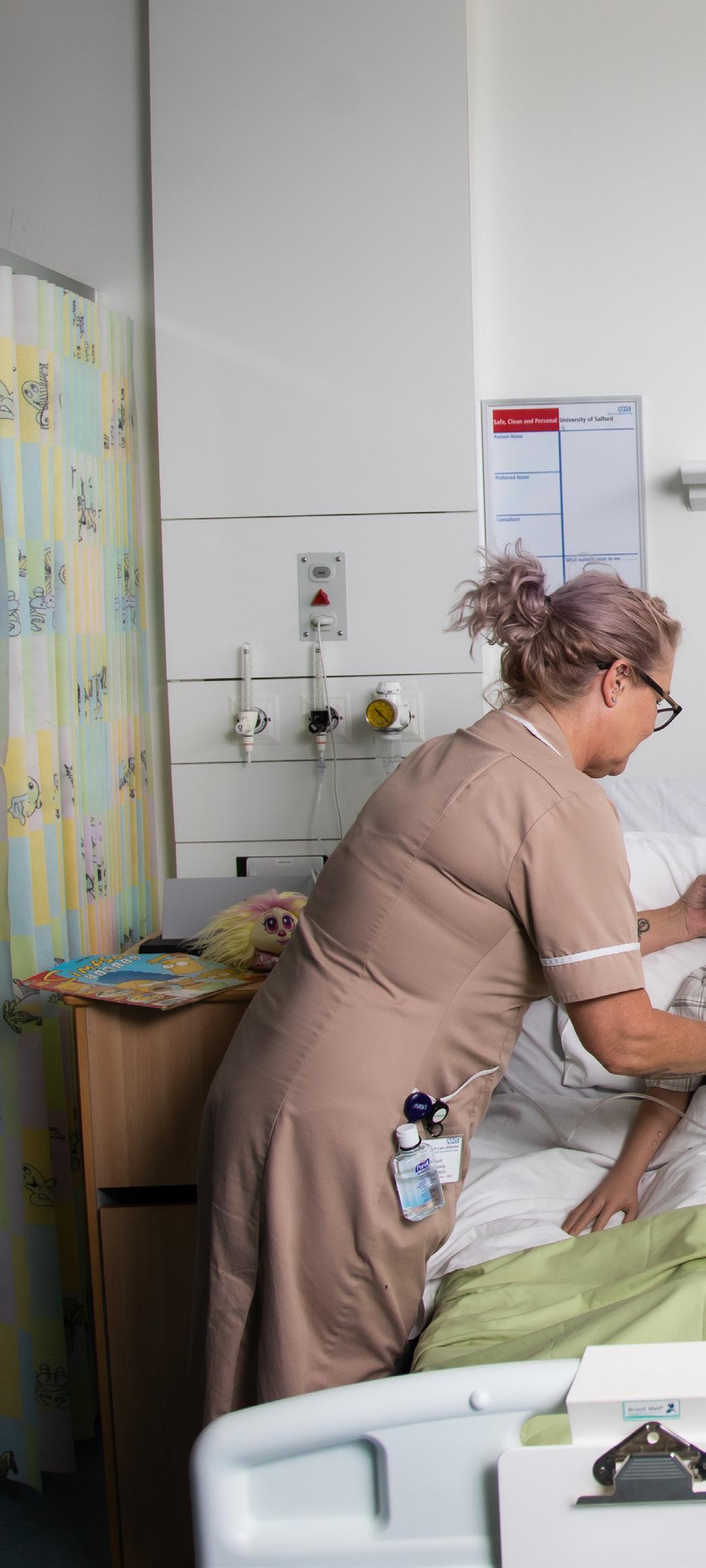
NURSING ASSOCIATE
LEVEL 5 HIGHER APPRENTICESHIP FDSC NURSING ASSOCIATE
SCHOOL OF HEALTH & SOCIETY
Nursing Associate Level 5 Higher Apprenticeship
FdSc Nursing Associate (Foundation Degree)




NURSING ASSOCIATE
LEVEL 5 HIGHER APPRENTICESHIP FDSC NURSING ASSOCIATE
Nursing Associate Level 5 Higher Apprenticeship
FdSc Nursing Associate (Foundation Degree)


Find everything you need to know about Nursing Associate apprenticeships, including:
/ What is a Nursing Associate?
/ What are the benefits of hiring a Nursing Associate?
/ What can Nursing Associates do?
/ What are the benefits of hiring a trainee Nursing Associate apprentice?
/ How do Nursing Associate apprenticeships work?
/ Pre-programme requirements
/ How is the apprenticeship delivered?
/ What does the apprentice study?
/ What are the programme requirements?
/ What is protected learning time?
/ Can Nursing Associate apprentices administer medication?
/ How is the apprenticeship assessed?
/ How do the finances work?
/ Are there any challenges?
/ Key enablers for a successful Nursing Associate apprenticeship
/ What does the University of Salford offer?
Nursing Associate apprenticeships are available to existing employees or new members of staff. They allow you to develop and retain talent within your workforce.
/ The Nursing Associate is a highly trained support role to deliver effective, safe, and responsive nursing care in a variety of health and social care settings.
/ Nursing Associates provide the workforce for future healthcare
/ The role bridges the gap between a health support worker and a graduate Registered Nurse and is regulated in England by the Nursing and Midwifery Council (NMC), the body responsible for regulating the nursing and midwifery professions.
/ Nursing Associates are registered with the NMC and accountable for their own practice.
/ The title Nursing Associate is protected in law in England and only those qualified and registered as Nursing Associates can use this job title.
/ Nursing Associates will have a Level 5 Foundation Degree, having demonstrated that they have met the robust NMC standards of proficiency for Nursing Associates.
/ A qualified Nursing Associate will work under the direction of a Registered Nurse.
/ Nursing Associates are generically trained and therefore can work in a range of settings within primary care, secondary care, social care etc.
/ Apprentices learn to care for people who may be vulnerable and require caring activities across the full range of the life span, and the four fields of nursing: adult, children, mental health and learning disability.


/ Develop the talent you need in your workforce
/ Adds value to your organisation
/ Drive an increase in productivity
/ Recognise and develop talent in your existing workforce
/ Support workforce retention and attract high quality staff through career progression
/ Optimise your nursing team skill mix
/ Provides a wider skill mix within multidisciplinary teams.
/ The role will contribute to the core work of nursing, freeing up registered nurses to focus on more complex clinical care
/ Improve patient and service user experience, safety and satisfaction
/ Future proof your workforce for nursing in the digital age
Nursing Associates are registered with the NMC and are therefore accountable for their own practice. This is the key difference to the role of the unregistered health care support worker. Nursing Associates must represent the knowledge, skills, behaviours and attributes that all registrants must demonstrate when caring for people of all ages and across all care settings.
Nursing Associates also expand the capacity of the nursing team in primary, secondary, and social care and as such can support registered nurses in their expanding roles.
Some of the skills that the Nursing Associate will be able to safely demonstrate are:
/ Provide patient assistance and care across the four fields of practice
/ Venepuncture
/ Height, weight and BMI checks
/ Lifestyle advice
/ Patient and family support and education
/ Provide reassurance by answering questions and offering emotional support to individuals across the life course
/ Physical health checks including performing blood pressure checks and ECGs
/ Wound care
/ Measure & interpret blood glucose levels
/ Effectively share information and check understanding about acute and long-term conditions
/ Vaccinations including travel and childhood immunisations in general practice
/ Apply generic nursing knowledge
/ Protect vulnerable patients such as young children, patients with physical disabilities or those with mental health issues
/ Act as practice supervisors and assessors


/ Offers a fresh perspective to your organisation
/ Nursing Associate apprentices contribute to the main foundations of patient care
/ Helps grow and maintain your organisations healthcare workforce by offering a programme that is accredited by the Nursing and Midwifery Council
/ Improves staff retention by offering a clear progression plan for employees
/ Promote long-term loyalty and reduce staff turnover
/ Can be moulded to fit your organisations needs and requirements from commencement of employment.
/ Develop staff with a minimum of interruption to day-to-day operations.

Employment and Administration
/ You employ your apprentice on a two-year one month apprenticeship. This can be a new recruit or an existing employee
/ The University will handle the administration related to that training, whilst the employer handles the administration relating to human resources
/ The University will support and help you navigate through every step of the process
Pre-apprenticeship requirements (employee/recruit)
The existing employee or new recruit must meet several pre-programme requirements
/ Maths & English Level 2 or GCSEs grade 9 to 4 (A to C)
/ Successful interview for the programme
/ Good health and character
/ Visa and Right to Work in England
/ Enhanced DBS clearance
/ Minimum contract of 30 hours/week
/ Complete required onboarding and paperwork
/ Must attend the “introduction to the apprenticeship” week in full (week 1). Absence for any reason will result in the removal from the cohort
Gaining skills and experience
/ The trainee Nursing Associate apprentice will be based, as an employee, in a particular organisation, in a specific setting, but will experience working in alternative settings in order to gain a wide appreciation of many health and care contexts and are able to fulfil all the requirements of the programme
/ The apprentice works as part of your designated team delivering care that focuses on the direct needs of the individual and will carry out specific delegated tasks and responsibilities to a high standard and competency
Apprenticeship delivery
/ The Nursing Associate training programme combines and integrates both academic and work-based learning
/ The course has a 50/50 split between theory and practice activity across both University teaching and learning with employers or via external placements
/ Nursing Associate apprentices are typically employed 37.5 hours/week in a salaried position (minimum 30 hours)
/ The University of Salford delivers the academic aspect of the programme
/ Each programme year encompasses three trimesters. Each trimester is constructed with one block of university taught theory (typically 5 consecutive days), day release university taught theory (typically over 10 weeks) and blocks of practice (typically six weeks)
/ During day-release weeks apprentices work clinically for 30 hours (pro rata part-time) and attend University for 7.5 hours
/ The Nursing Associate will undertake a variety of placements. For some specialist/smaller organisations, apprentices may be required to undertake placements in a neighbouring organisation
/ The apprentice is expected to complete a minimum of 460 hours of external placements
It is a funding requirement that apprentices complete a minimum of 6 hours (approximately 20%) of their working week as off the job training, the hours a learner spends at university are counted towards this.
Off the job training is classed as training that is received during paid working hours that is not in the main area of employment for the purpose of achieving the knowledge, skills, and behaviours of the apprenticeship.
Off-the-job training is defined as learning which is undertaken outside of dayto-day work duties and leads towards the achievement of the apprenticeship. This training takes place within the apprentice’ normal (contracted) working hours. The off-the-job training must be directly relevant to the apprenticeship.
Practice supervision and assessment
/ Nursing Associate apprentices will need to be supervised and supported in the workplace.
/ Nursing Associate apprentices can be supervised by an NMC-registered nurse, midwife or nursing associate, or by any other registered health and social care professional. Supervisors will serve as role models for safe and effective practice and are expected to contribute to the record of achievement
/ Practice Assessor and Practice Supervisor training must meet NMC Standards for student supervision and assessment.
/ Practice assessment is divided into three main areas and recorded via PARE (Practice Assessment Record and Evaluation)
1. The assessment of competence
2. A record of assessor and supervisor interviews with their student in practice
3. The assessment of performance
We run monthly orientation events for new employers and support with interviews on campus or at the employers’ premises.
Our dedicated team supports the onboarding process for successful candidates.
The University can support employers with recruitment days including talks, stalls or presentations as required.
We run orientation events for successful candidates before the start of their first week on campus.
We support apprentices and employers with a team of Clinical Educators and Learning and Development Coaches throughout the programme
As the apprentice’ employer you are responsible for / New employers only: Attending one of our employer programme introduction sessions. Attendance is mandatory and must occur before commencing your internal expression of interest processes. Your employee will not be able to enrol onto our apprenticeship if you have not attended a session.
/ Placements (including external placements and those to meet the breadth of experiences)
/ Annual leave
/ Employment contract
/ Enhanced DBS
/ Disciplinary process
/ Occupational Health/wellbeing
/ Monitoring and management of sickness/absence
/ Uniform
/ Pay
/ Attending 12-weekly progress review meetings
/ Supervision and assessment of your apprentice

/ They study three 40 credit modules each year, six modules in total throughout the programme (240 credits)
/ Salford’s curriculum aligns with the NMC standards of proficiency
/ The first year will comprise of modules such as Foundations of Health and Wellbeing, Application of Skills to Support Health and Wellbeing 1 and Application of Skills to Support Health and Wellbeing 2.
These modules will allow apprentices to develop their professionalism, interpersonal skills and find out more about human anatomy, person-centred care, safeguarding and public health and health promotion.
/ The second year of the programme will include modules such as; Exploring Specific Health Issues, Preparation for Professional Practice and Developing and Changing Practice.
These modules will develop knowledge of long-term conditions, medication management, coaching and supervision skills, service improvement and nursing interventions




Successful completion of all academic modules and Practice Assessment
Evidence of good health and
Evidence 2300 hours Protected Learning Time (including Protected Learning logs) = 50% practice (PLT-P) and 50% theory (25% PLT-T and 25% University)
100% in health numeracy test Exposure to breadth of experience (Fields of Practice)
460 hours (minimum) external placements (spoke placements)
/ 60 hours learning experience and completion of workbook in each of the four fields of practice (Adult, MH, LD, CYP)
/ Demonstration of learning experiences in the care across the life course
/ Participation in 24-hour care delivery
/ Demonstration of breadth and variety of placements (for example at home, close to home, in hospital)
/ Completion of Ongoing Achievement Record (x12 PDPs and x12 reflective accounts)
/ Completed skills annexe
Protected Learning Time Practice (PLT-P)
/ Nursing Associate apprentices do not require to be supernumerary in their own place of work while learning in practice, but the apprentice must have ‘protected learning time’.
/ Protected Learning Time - Practice (PLT-P) is time in the apprentices’ own place of work which will be identified as full shifts, during which the apprentice can be counted in the staff numbers.
/ On these PLT-P shifts, the TNAs will have a clearly identified Practice Supervisor/Practice Assessor, with whom they will identify appropriate learning goal/s for that shift.
/ The Practice Supervisor/Practice Assessor will facilitate opportunities to achieve that goal and will provide feedback prior to the end of the shift.
/ Evidence of the learning must be recorded by the apprentice and signed by the Practice Supervisor/ Practice Assessor.

Protected Learning Time Theory (PLT-T)
/ Protected Learning Time – Theory (PLT-T) are hours achieved external to the allocated placement, where apprentices will be supernumerary.
/ These will be rostered in advance in consultation with the Practice Supervisor/Practice Assessor.
/ These organised rostered PLT-T activities should not be cancelled due to staffing shortages unless patient care is compromised.

University Taught Hours (UTH)
University Taught Hours (UTH) are those hours accrued during timetabled study provided by the University. A typical University day runs from 09.00hrs to 17.30hrs.
(NPH)
/ Non-programme Practice Hours (NPH) are on-the-job shifts in the apprentices’ own place of work
/ Nursing Associate apprentices will still be identifiable as apprentices (either through uniform or ID badges in areas where uniform is not worn) but will not set specific goals with their named Practice Supervisor/Practice Assessor for the shift.
/ Apprentices will spend time within the workforce, practising and consolidating their skills.
/ Employers will always encourage and facilitate a learning environment that supports the apprentice to access the learning opportunities required to achieve and consolidate learning.
/ These are hours above and beyond the required number of programme hours.

Only registered Nursing Associates are able to administer medicines as part of their role, following additional training and education and where the required governance structures are in place. The employing organisation must be assured that practising Nursing Associates have the qualifications, competence, skills and experience to undertake the activities required of them.
Our recommendations for trainee Nursing Associate apprentices include ensuring adequate supervision to support them in the education and training of medicines management within the confines of local employer policies.
/ Give ANY medications to patients without direct supervision
/ Sign or countersign for any medications independently
/ Set up or start IV fluids or IV medications
/ Perform any task they are not competent to do
/ Administer under PGD
/ Attach to, or disconnect from a patient any IV fluids, antibiotics or drugs
/ Administer medication they have not had the appropriate theory and practical assessment for

/ Throughout the apprenticeship, apprentices will be assessed in both clinical placements and in the University. Assessment will take place via a range of methods including practice assessments, essays, objective structured clinical exam (OSCE), presentations and viva examinations.
/ All apprentices will need to complete an End Point Assessment (EPA) as part of their apprenticeship. An EPA is completed following successful completion of the twoyear programme to confirm the apprentice has met the apprenticeship standard and is occupationally competent. This can only be taken once the Level 5 Foundation Degree has been completed successfully.
/ This programme has an integrated EPA, so there are no additional assessments as part of this apprenticeship route. The final examination board, the oversight of an external examiner and finally informing the NMC of successful completion are defined as stages of the EPA.
/ The current programme cost is not yet available. For guidance, the 2023/24 cost was: £15,000. Our programme cost is subject to annual review
/ If you pay the Apprenticeship Levy, the apprentice’s tuition fees are paid from your Digital Account
/ If you do not pay the Apprenticeship Levy, the apprentice’s tuition fees are funded through co-investment or via a levy transfer from another levy employer
/ Apprenticeship is a full or part-time (30 hours minimum), salaried position
/ Apprentice is eligible for employee benefits
/ Apprentice is not eligible for a student loan
All funding and finance from other programmes (including student loans) need to have ended before commencing the NA apprenticeship.


Employers and apprentices may encounter several challenges throughout the programme. For example:
/ Lack of acceptance of the trainee Nursing Associate role from professionals
/ Lack of awareness and understanding of the role
/ Lack of understanding of the training requirements
/ Role seen as a threat to other roles such as assistant practitioners and registered nurses
/ Poor implementation and use of the role, such as the trainee being used as a healthcare assistant when service demand is high. Using the roles in this way will lead to poor placement experience and a lack of exposure to learning opportunities
/ Listen and work with your apprentices to help develop and embed the programme into your organisation
/ Consider in advance how to best support your trainee Nursing Associates. For example, a practice-based educator post can offer oneto-one support and help to bridge academic learning and their day-to-day practice
/ Support the apprentices by promoting their role and its benefits widely among the workforce, including communications about myths relating to the role
/ Plan and set goals for the apprentice with their assessor and supervisors to help ensure successful placements
/ Promote a strong support network, particularly peer support
/ Ensure there is sufficient protected learning time to make best use of learning opportunities and experiences in the workplace. For example, demonstrating new skills, shadowing opportunities, supervision during new tasks and involvement in meetings


1.
Our Nursing Associate Higher Apprenticeship course provides apprentices with the required knowledge, skills, and behaviours they need to meet the Nursing Associate Foundation Degree Apprenticeship and the Nursing and Midwifery Council Nursing Associate Standards.
2. Upon successful completion of the course the apprentice will have the ability to register as a Nursing Associate with the Nursing and Midwifery Council.
3.
The Nursing Associate Higher Apprenticeship allows learners to combine studying with employment, pay zero tuition fees and boost their nursing career with academic study alongside on-and-off-the-job learning.
4.
5.
Funded through the apprenticeship levy our Nursing Associate Higher Apprenticeship provides an affordable solution to staff development.
Integration of the teaching, learning and support that the University offers alongside coaching and training offered within your healthcare setting.
6. The University cannot guarantee any particular members of staff will teach specific aspects of the course in the future but will endeavour to ensure the teaching team maintains their balance of experience and qualifications.
7.
We do not charge to attend graduation, but apprentices will be required to pay for the rental of their academic gown.
What are my responsibilities as an apprentice employer?
By and large, your responsibilities are to provide real, work-life experience for the apprentice. In addition to allowing them time to complete their off-the-job training. As part of this training, they will typically have to evidence knowledge and will require regular reviews to document their progress. The programme will also involve liaising with the training provider (University of Salford) to ensure the smooth running of the programme.
Does the structure of the Salford Nursing Associate apprenticeship align with the Education and Skills Funding Agency’s ‘on the job’ and ‘off the job’ rules?
Yes, as a training provider we must follow the rules set out by the ESFA to get funding for training and assessing apprentices in England. Our alignment is reviewed annually.
What is meant by off-the-job training (ESFA)?
Off-the-job training is an apprenticeship funding requirement and is defined as learning which is undertaken outside of day-to-day work duties and leads towards the achievement of the apprenticeship. This training takes place within the apprentice’s normal (contracted) working hours. The off-the-job training must be directly relevant
to the apprenticeship and the programme requirements and includes attending university, and all learning that takes place beyond the apprentice’s day-to-day duties such as spoke placements, working with specialist practitioners, and practical training: shadowing, mentoring, placement visits, or completing workbooks.
What is meant by external placement hours (NMC)?
External placement hours are an NMC requirement. Under the requirements of the NMC curriculum apprentices are expected to complete a minimum of 460 hours of external placements. These must cover experience in care across the life span, experience in a variety of settings, and exposure to all four fields of nursing (adult, children, learning disabilities and mental health).
External placements are typically undertaken outside of the apprentices’ usual place of work and leads towards the achievement of the programme requirements. External placements take place within the apprentice’s normal (contracted) working hours. The apprentice is supernumerary during this time.
Who arranges external placements and offthe-job training?
The employer is responsible for all placement arrangements and all off-the-job training except university teaching.
What are Progress Review Meetings (PRMs) and who needs to attend?
Each apprentice’s progress must be regularly reviewed and assessed. You must carry out Apprentice Progress Reviews with the apprentice and the University no less than every 12 weeks. The scheduling of PRMs is led by the University.
Do Nursing Associates have access to further development?
Yes, there is also access to further development including advancement to a registered nurse position through degree top-ups.
Can I make an apprentice redundant if need be?
Similarly to dismissal, apprenticeship agreements enable an employer to treat an apprentice similarly to any other employee. With apprenticeship contracts, redundancy can only occur in circumstances in which the placement is no longer viable such as, the business shutting down.
Can I let an apprentice go if needed?
Most apprenticeships in England and Wales fall under an apprenticeship agreement however apprenticeship contract permits dismissal in only the most serious of circumstances. Therefore, it depends upon the type of apprenticeship on offer. Apprenticeship agreements on the other hand enables dismissal in the same way as any other employee.
Can my apprentice take a break in learning?
The rules and requirements for breaks in learning are subject to annual changes. Typically, the
apprentice must be involved in active learning throughout the apprenticeship, from the learning start date to the learning actual end date. Some active learning must take place each month or a break in learning must be used.
The apprentice may also request to take a break in learning from their apprenticeship programme if they plan to return to the same apprenticeship at a later date. The decision to take a break in learning, the reason for the break and its expected duration must be agreed with the employer.
Can my apprentice transfer to another employer?
Yes, this is possible. Where there is a change of employer and the gap between employers is 30 days or less, the change in circumstance can be recorded by the University as a continuation in the original learning aim. The original employer must stop payments through their apprenticeship service account, using a stop date that corresponds with the date the apprentice changed employer.
My employee has no certificates and/or only provisional marks. Can they still start the course?
For the nursing associate degree apprenticeship we need fully ratified marks, meaning they went through the providers internal and external moderation process and exam/certification board. Until marks are fully ratified, they are merely preliminary, and we can’t accept them. Relevant certificates should be available at the point of interview.
NMC Standards of proficiency for registered nursing associates
www.nmc.org.uk/standards/standards-for-nursing-associates/standardsof-proficiency-for-nursing-associates/
NMC Standards for student supervision and assessment
www.nmc.org.uk/standards-for-education-and-training/standards-forstudent-supervision-and-assessment/
IFATE
www.instituteforapprenticeships.org/
IFATE Nursing Associate Standard ST0827
www.instituteforapprenticeships.org/apprenticeship-standards/nursingassociate-nmc-2018-v1-1

